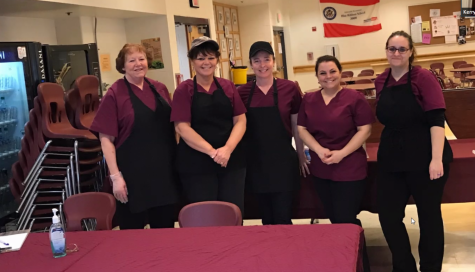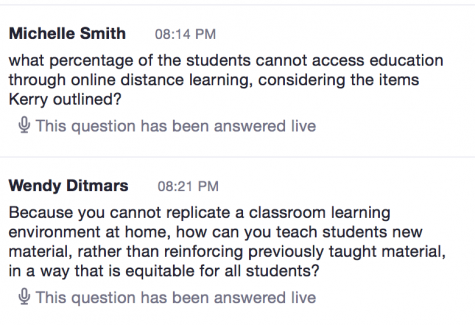School Committee meeting updates residents on impacts of COVID-19
Update 3/25/20: Governor Baker announced that all schools will be closed through May 4, 2020.
March 24, 2020
As COVID-19 infiltrates the Westford area, the School Committee led another virtual meeting on March 23 to continue discussing the virus’s impact in town. Governor Charlie Baker has instituted a stay-at-home advisory starting today March 24 and the town has declared a local state of emergency.
As a result of Governor Baker’s policy, the committee discussed several ways by which the virus will result in social and academic changes in Westford, as well as their concerns.
First and foremost, the current April 7 return date of staff and faculty to normal school life is in question; the state may push this date out.
In addition, the grab-n-go lunch initiative will be modified and the district will provide families in need with one week’s worth of ingredients for those who stop by at WA. This modified process will continue until the governor lifts the stay at home advisory.

grab-n-go lunch team
“Colleen Wallace, our food service director, has an amazing team who are putting themselves out there every day to provide lunch for some of the families in need. And it has been very successful. There was a lot of thoughtful planning in terms of logistically how the food is being prepped, how people will line up keeping six feet away from one another,” Assistant Superintendent Kerry Clery said.
Subsequently, MCAS will be held at the end of May for WA freshmen and sophomores, given the return date to schools is April 7. As the governor has waived the standardized testing requirements for Massachusetts, there is some flexibility regarding the test administration dates. However, details regarding MCAS alternatives in the case that students don’t return this school year haven’t been clearly determined at the state level yet.
“Because those testing requirements have been waived, there’s some flexibility in the case that if we were ever in a situation where we don’t return to school until the end of the year, then […] we may not offer MCAS at all, or do something creative for the high school MCAS because that is a graduation requirement. […] Sophomores who take MCAS still have their junior year and senior year to retake, so we may just rely on retakes or that particular class may be waived,” Clery said.
The College Board has also modified its AP exam schedule, and made it possible for students to take a 45-minute test consisting of only free response at their homes on one of two dates. The exams will consist of content most AP teachers were able to cover with their students up until early March, around when schools started shutting down.
“Through our members across the country, we understand the new time constraints on everyone in the education community. These solutions [that we’re presenting] are meant to be as simple and lightweight as possible for both students and teachers […] The full exam schedule, specific free-response question types that will be on each AP Exam, and additional testing details will be available by April 3. We’ll also unlock any relevant free-response questions in AP Classroom for digital use so students can access all practice questions of the type that will appear on the exam,” College Board’s website stated.
Furthermore, the school committee voted unanimously to financially support all hourly-paid and salaried employees during this time with regular base salaries. The committee has created several alternative work solutions for staff to contribute in moving the school district forward, very different from typical tasks that they do throughout the school day.
Committee member Ingrid Nillson has sorted through the implications that arise with paying all employees, and will continue to look into that matter to see how it financially impacts the budget and the town. The majority of staff is paid from the general fund budget, in addition to the hundred or so salaries that come out of other funds, grants, and revolving funds.
That being said, the town will experience a significant drop in revolving funds. $240,000 will be lost from kindergarten programs, $80,000 from pre-schools, and $200,000 from athletics fees that are taken in by the spring season. However, the committee believes that supporting staff during this time is paramount.
“We [the committee] value the staff, and we absolutely feel that everyone plays a vital role in the success of the district. So in light of that, […] I think it’s the entire district’s recommendation that we honor our commitments to our staff and continue to pay them regular base wages and salaries throughout closure and through the end of the school year. I really just think, we’re all experiencing so many external anxieties, this is one anxiety we can [alleviate] for our staff,” Nillson said.
Moreover, another central issue Clery highlighted was the ongoing struggle between families and the school committee regarding distance learning opportunities. The committee has already created Choice Boards for its students, which are optional enrichment activities that students can complete. However, some parents, such as Westford resident and physician Andrew Popelka, believe as though the district needs to plan ahead and provide students with the direct learning intervention that Choice Boards cannot supply.
“Choice Boards are nowhere near enough for actual learning and education. They keep kids busy, but this is not learning and teaching. Yes, we should consider all students, but we can get 90% of them up and running now, and let’s tackle the problems of access, computers, IEP, etc. as a community. We cannot wait to get everything lined up, as is being described,” Popelka said.
Committee member Avery Adam also noted another common fear that students may need extra Tier 2 math and reading intervention due to this cessation of learning new material.
However, Clery believes that introducing mandatory learning activities for students could exacerbate the academic gap that she believes the district is working to bridge. While distance learning could be a helpful and feasible initiative for some, other demographics in the district may find this difficult.

From the students’ side, Clery believes this includes but is not limited to those who cannot speak the English language and will require extra comprehension support and lack enough digital support to accommodate virtual environment. Also, mandatory distance learning could negatively impact students who lack the luxury of having an adult facilitate such education at the lower school levels, must watch younger siblings, as well as students whose home environments may not be physically and or emotionally conducive to at-home learning.
Echoing Clery, School Committee member Megan Eckroth also believes that virtual classrooms can be difficult for many young staff members who will also have to care for and facilitate learning for their own children, as well as the fact that many adults who’ve recently been laid-off and should focus on their family’s needs first.
“I know there have been conversations about ‘oh well I heard from mine but you didn’t hear from yours’ or ‘I heard from my fourth grade teacher but not from my second grade teacher,’ and first, I just want to acknowledge that all of these teachers are in many cases also parents that are dealing with their own, as you said, home situations,” Eckroth said.
Overall, the school committee assures families that two to three weeks without traditional education will ultimately not be detrimental to students. Committee member Gloria Miller sees that although some families feel as though education is a “race,” many families have needed this time to recoup with their current home situations.
“Right now these students need TLC, they need to understand and adjust to their new normal of just simply being home. I’ve had families say, ‘thank you so very much for allowing us time to adjust and not pressuring us, feeling like on top of figuring all of this out, we’ve got to school our kids now too.’ So while I understand that perspective, and am very sensitive to those people, there’s also the others that say ‘thank goodness because we couldn’t do it and,’ and my household is of them,” Miller said.
Having faced this type of dilemma himself, Committee member Chris Sanders also exemplifies the reality of the situation.
“It’s a time of uncertainty. We have families grappling with uncertainty about work, uncertainty about health, uncertainty about child care. I’m speaking for myself […] The thought of us like ramping up into some sort of a full remote distance learning situation would have been really hard,” Sanders said.
Through considering Clery’s three-pronged approach of what students need to know for their next grade level, what students need to know for standardized tests, and what students need to know in life, the district hopes to identify what skills and content are necessary moving forward. In the future, this will help the district find a balance between the depth and breadth of material taught in any remaining portion of the school year.
On a social level, the committee acknowledges the efforts from teachers and other members of faculty to reach out to students, in an effort to establish a connection with them online. School Committee member Megan Eckroth notes the social benefits of this interaction, stating that it offers ‘normalcy’ in the anxious atmosphere the town is in right now.
“I’ve seen principals either encouraging the teachers, or giving them guidance as to the best ways and the methods and how they should be going about reaching out to their students, or flip it the other way, if particular students are really craving connection. I think that is something that is so incredibly important, and probably most important is that social emotional piece and when students see creative ways that teachers are reaching out to them, I think it provides a level of normalcy even though there’s no normalcy right now that exists,” Eckroth said.